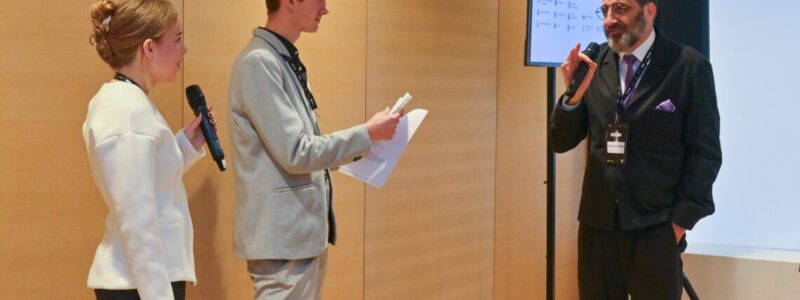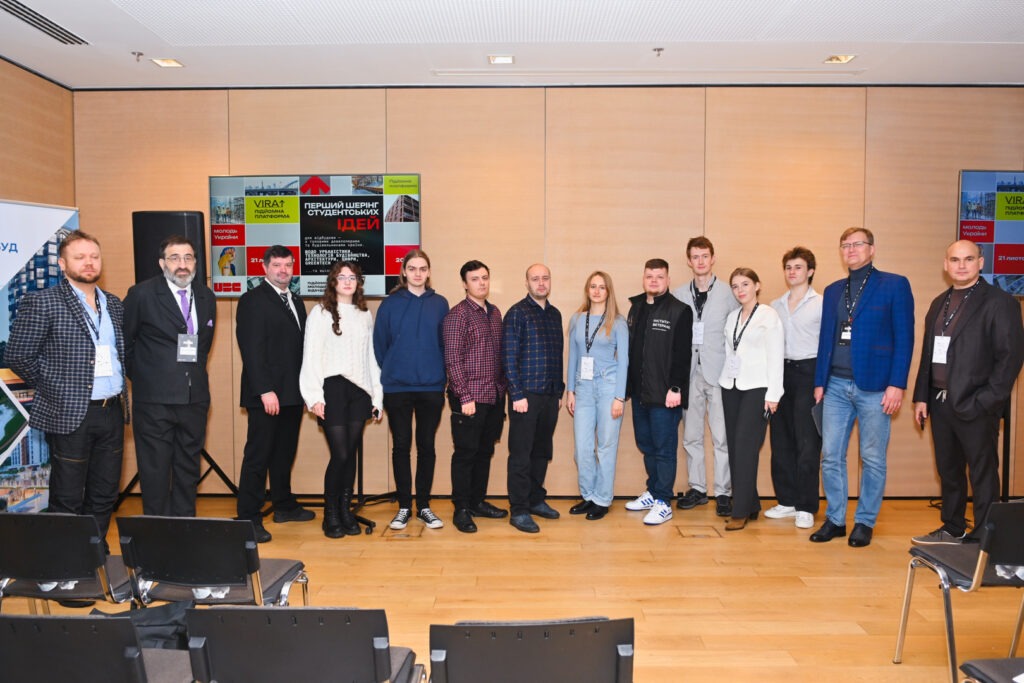
Students and young scientists from the Kyiv National University of Construction and Architecture, with the support of university scientists, presented five innovative projects in the field of construction and architecture as part of the VIRA! pilot project during the V Ukrainian Construction Congress, which took place in Kyiv.
VIRA! is the first pitching platform developed by entrepreneurs to promote innovative solutions in the construction industry. The platform aims to bring together experts and investors with young engineers, architects, and designers who are seeking change for real reconstruction projects.
Here is a brief overview of the projects presented by KNUBA students.
Veteran spaces: Yevheniia Horova, Yevheniia Kostinska, Artem Honcharenko.
A project to create a multifunctional space to provide comprehensive (psychological, medical, social, professional) support to veterans. The main challenge is to rebuild not only buildings but also communities. Each veteran space should be multifunctional and community-oriented. The project requires a flexible approach to design and a multidisciplinary approach involving the community.
Concrete for 3D printing using recycled materials from destroyed buildings and structures: Ivan Ivanov, Oles Lastivka
A project to implement promising 3D printing technology using the remains of war-destroyed buildings and agricultural waste. The goal is to ensure fast, high-quality, and cost-effective reconstruction and solve the problem of construction waste disposal, up to 90% of which consists of debris. The technology also allows for the creation of complex architectural forms for spaces that promote recovery, such as veterans’ spaces.

Fungal technologies and circularity in reconstruction: Kateryna Krolenko, Sofia Galat, Anastasia Melnyk
A project to apply mushroom technologies and circularity in the reconstruction of Ukraine. Taking into account the principle of build back better, testing of the latest environmentally friendly materials, in particular insulation based on mushroom mycelium, is ongoing—not only in laboratories but also in field conditions. The tasks for the next stages include improving the technical qualities of the fungal composite and R&D of the insulation in construction laboratories, as well as working with policymakers on certification and asbestos issues, resource mobilization, and community education.
Administrative Services Center: Yulia Gerya, Danylo Galik
The Administrative Services Center (ASC) project is the winner of an open architectural competition among KNUBA students for the best conceptual project for the reuse of an energy-efficient building to provide administrative services with improved environmental characteristics, “Green Reconstruction in Action.” The master plan includes the ASC building with solar panels on the roof, a shelter, a parking lot, and a utility area. The project demonstrates a comprehensive design that combines a modern facade with detailed planning of all areas.
Game-Based Learning for the Development of Management Competencies: Mykhailo Karpov, Artem Vasyuk, Vladyslav Kontsevyi
The project proposes the use of the Smart PM City educational computer game for building a “smart city,” which is based on project management principles, for the effective training of project managers. A safe environment for mistakes has been created, where participants can experiment with solutions without real risks, but with corresponding consequences in the game. The game develops management skills through the task of building a long-term city development strategy, balancing short-term benefits and long-term investments. It is a universal solution for integrating various educational topics: management, finance, marketing, ecology, etc.
Launched by the organizers of Ukrbudcongress, the VIRA! lifting platform has become a unique space where young people shared their ideas for the future reconstruction of Ukraine with an expert audience—construction business owners and leading industry specialists. The opportunity to receive professional feedback and recommendations for better implementation of ideas and developments became a real pitching of solutions for the future reconstruction of Ukraine and helped to understand how exactly it is possible to influence the future of the industry.
“University education cannot be separated from the market and the situation in the country. We can only develop and produce quality results in close cooperation with stakeholders at various levels. We are now presenting five projects and hope that there will be more next year. We are proud that the projects presented have developed from student initiatives or have arisen in response to requests from our stakeholders in the public sector and business. Businesses have a clear vision of their development path, and the advice of practitioners will be very useful for us, for students, and for young scientists,” said Oleksandr Kovalchuk, Vice Rector for Scientific Work and Innovative Development at KNUBA.
Mark Kestelboim, founder and moderator of the platform, CEO of Well-Being Contech, noted:
“Today, Ukraine has a real opportunity to set an incredible precedent: to become a laboratory of innovation, a startup platform within the entire country, where modern standards and inclusion are combined with sustainable technologies for the sake of the future. VIRA! is the first event that will serve as a bridge between young innovators and businesses seeking change. I hope that the platform will become a regular event and that its results will go beyond the platform and bring real benefits to the country.”
The experts in the professional dialogue with students were Anna Iskierdo, creative director and co-founder of AIMM (a graduate of KNUBA), Yaroslav Korniyachenko, founder and CEO of Vlasne misto, Mykhailo Tarasyuk, Big Waves development, Serhiy Odarych, founder of ODA Development, and Vitaliy Borul, CEO of Credo Development.
The topics that the VIRA! project will continue to focus on are urbanism and territorial development, digital technologies in construction management, architecture and new housing typologies, sustainability and green technologies, innovative materials and structures, community solutions, and social services.
ASC, GONCHARENKO, innovative project, Kestelboim, KNUBA, VIRA!, Ковальчук